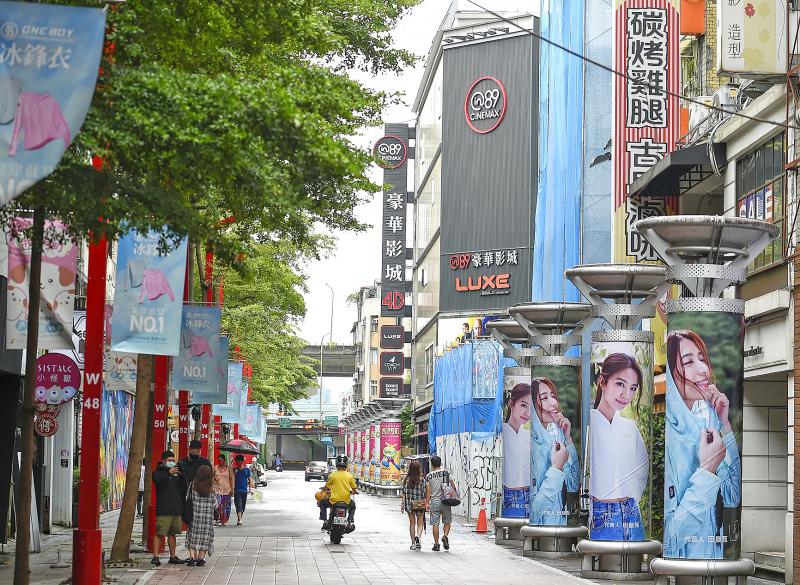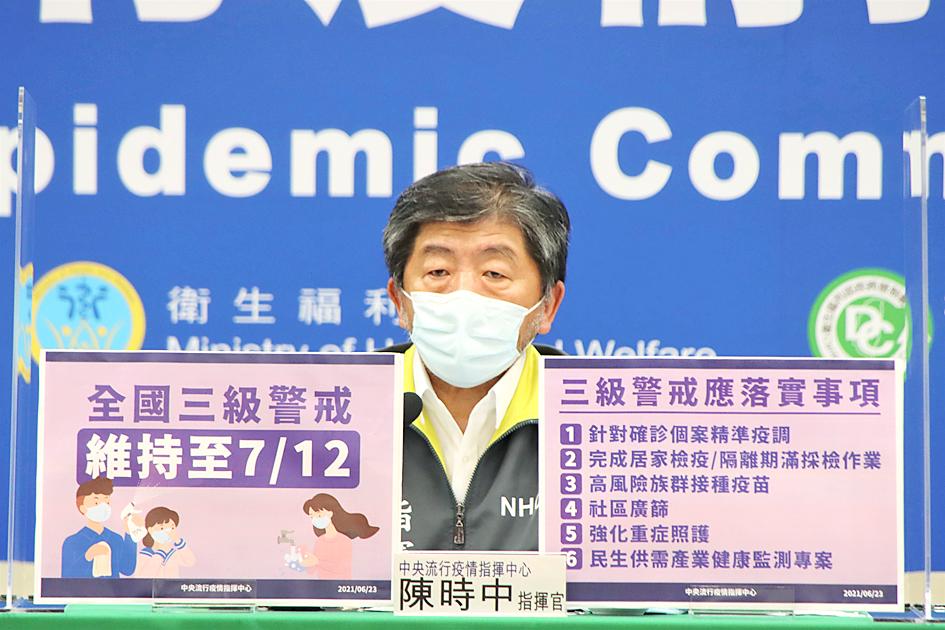The Central Epidemic Command Center (CECC) yesterday announced that a level 3 COVID-19 alert has been extended by two weeks until July 12, while it reported 104 locally transmitted cases and 24 deaths.
The alert was first issued in Taipei and New Taipei City on May 15, and expanded nationwide on May 19. It was originally due to end on Monday next week, but it was extended for the third time yesterday.
“The level 3 alert will continue to be implemented until July 12,” Minister of Health and Welfare Chen Shih-chung (陳時中) told a news conference at noon.

Photo: Chen Chih-chu, Taipei Times
“Although the situation has improved during the alert period, it has not reached our goal yet,” said Chen, who heads the CECC. “Let us all continue to endure it for two more weeks and do our best to hopefully achieve a more stable situation after July 12.”
All of the restrictions remain the same, but six measures require enhanced implementation, Chen said.
The six measures include “conducting precise contact tracing” to identify close contacts and place them under isolation as soon as possible, he said, adding that it became more difficult to implement precise contact tracing and prompt isolation when local infections rapidly increased last month, but the situation has improved.

Photo courtesy of the Central Epidemic Command Center
Immediate isolation can reduce virus transmission within households, but it can be difficult to cut chains of infection if contact tracing to identify close contacts at workplaces or in social circles is not thorough, he said.
The second measure — mandatory testing of people ending home isolation or quarantine — was announced on Tuesday, while the third is accelerating vaccinations in high-risk groups to reduce infections, serious complications and deaths, he said.
The fourth is “wide screening,” which includes performing tests at local community stations or at companies, as well as the use of at-home test kits, which came on the market yesterday, he said.
The fifth measure is “improving treatment of serious cases of COVID-19,” including importing medication and having experts discuss treatment methods regularly, he said, adding that the last measure is launching a special health monitoring program for the daily necessities sector, mainly markets.
Reporters asked whether the alert extension was due to cluster infections that have been reported at several venues in Taipei in the past week, including 54 cases linked to Taipei Agricultural Products Marketing Co (台北農產運銷) and 47 cases at a long-term care center in Shilin District (士林).
The clusters were considered, but the decision was “not directly linked to them,” Chen said, although he added that contact tracing in response to the clusters was not thoroughly implemented.
Hopefully, accurate contact tracing and prompt isolation would be improved in the next two weeks, he said.
The CECC reported 104 local infections, 45 males and 59 females aged from under five to over 90, whose symptoms emerged between June 10 and Tuesday.
New Taipei City reported 45 cases, Taipei 22, Hsinchu County and Kaohsiung nine each, Taoyuan seven, Miaoli County four, Keelung three, Yilan County two, and Changhua, Nantou and Pingtung counties one each, CECC data showed.
Of the 24 deaths, 15 were men and nine were women, with their ages ranging from 40 to 90, the data showed.
All but one of them had underlying health conditions, the data showed.
Centers for Disease Control Deputy Director-General Chuang Jen-hsiang (莊人祥), the CECC’s spokesperson, said that six people from Taiwan tested positive for COVID-19 upon arrival in Xiamen, China.
Four of them were confirmed cases in Taiwan and had been released from isolation, while the other two tested negative more than once in Taiwan, Chuang said.
The CECC would conduct contact tracing to identify their close contacts in Taiwan, he said.

CALL FOR SUPPORT: President William Lai called on lawmakers across party lines to ensure the livelihood of Taiwanese and that national security is protected President William Lai (賴清德) yesterday called for bipartisan support for Taiwan’s investment in self-defense capabilities at the christening and launch of two coast guard vessels at CSBC Corp, Taiwan’s (台灣國際造船) shipyard in Kaohsiung. The Taipei (台北) is the fourth and final ship of the Chiayi-class offshore patrol vessels, and the Siraya (西拉雅) is the Coast Guard Administration’s (CGA) first-ever ocean patrol vessel, the government said. The Taipei is the fourth and final ship of the Chiayi-class offshore patrol vessels with a displacement of about 4,000 tonnes, Lai said. This ship class was ordered as a result of former president Tsai Ing-wen’s (蔡英文) 2018

UKRAINE, NVIDIA: The US leader said the subject of Russia’s war had come up ‘very strongly,’ while Jenson Huang was hoping that the conversation was good Chinese President Xi Jinping (習近平) and US President Donald Trump had differing takes following their meeting in Busan, South Korea, yesterday. Xi said that the two sides should complete follow-up work as soon as possible to deliver tangible results that would provide “peace of mind” to China, the US and the rest of the world, while Trump hailed the “great success” of the talks. The two discussed trade, including a deal to reduce tariffs slapped on China for its role in the fentanyl trade, as well as cooperation in ending the war in Ukraine, among other issues, but they did not mention

HOTEL HIRING: An official said that hoteliers could begin hiring migrant workers next year, but must adhere to a rule requiring a NT$2,000 salary hike for Taiwanese The government is to allow the hospitality industry to recruit mid-level migrant workers for housekeeping and three other lines of work after the Executive Yuan yesterday approved a proposal by the Ministry of Labor. A shortage of workers at hotels and accommodation facilities was discussed at a meeting of the legislature’s Transportation Committee. A 2023 survey conducted by the Tourism Administration found that Taiwan’s lodging industry was short of about 6,600 housekeeping and cleaning workers, the agency said in a report to the committee. The shortage of workers in the industry is being studied, the report said. Hotel and Lodging Division Deputy Director Cheng

‘SECRETS’: While saying China would not attack during his presidency, Donald Trump declined to say how Washington would respond if Beijing were to take military action US President Donald Trump said that China would not take military action against Taiwan while he is president, as the Chinese leaders “know the consequences.” Trump made the statement during an interview on CBS’ 60 Minutes program that aired on Sunday, a few days after his meeting with Chinese President Xi Jinping (習近平) in South Korea. “He [Xi] has openly said, and his people have openly said at meetings, ‘we would never do anything while President Trump is president,’ because they know the consequences,” Trump said in the interview. However, he repeatedly declined to say exactly how Washington would respond in